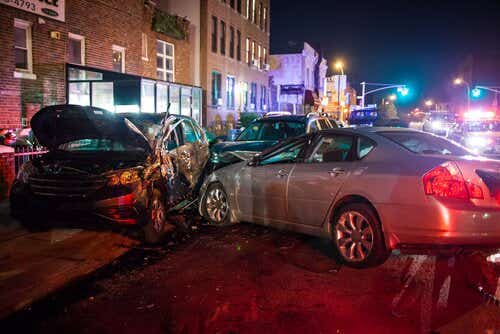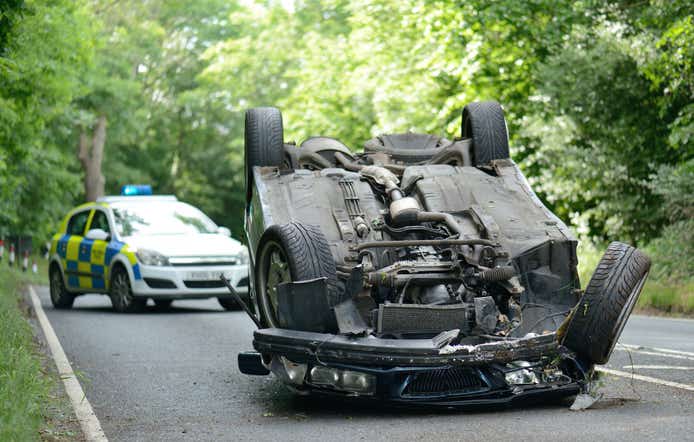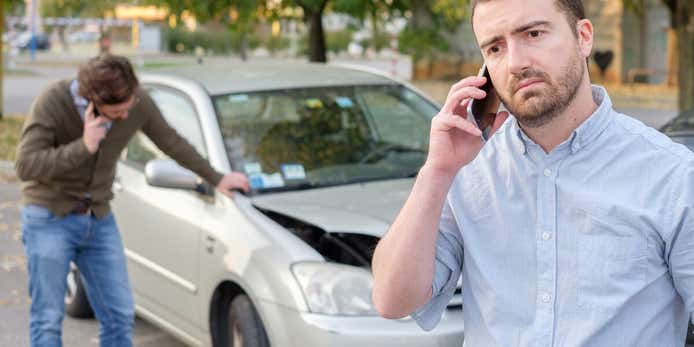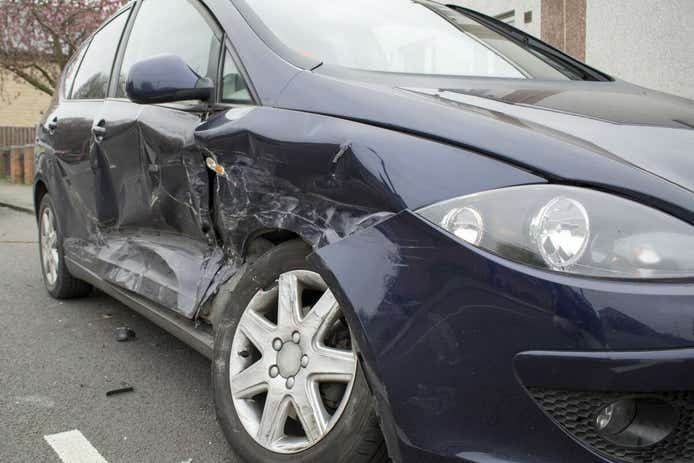What is a non-fault claim?
A non-fault claim is when a third party is involved and has complete liability for the incident. An example is someone pulling out at a junction and hitting your car, or hitting you from behind while your car is waiting at traffic lights.
In a non-fault claim, your insurer will attempt to recover any repair or replacement costs from the other driver’s insurance company.
But (and it is a big but) if your insurer can’t recover the costs from the guilty party – such as in the case of vandalism or a hit-and-run accident, or if the other driver is uninsured – the claim may be considered as an at-fault claim, even though you were not to blame for the incident.
How do I know whether an accident was my fault?
The main factor in determining if an accident was your fault or not is the law.
If you are speeding, on your phone or doing something else that is illegal, any accident you have is your fault. You can’t blame the other driver.
But if the blame is entirely on the other party, your insurer will treat your claim as being a non-fault claim.
However, in some cases, it can be hard to determine who was at fault.
Your insurance provider and the other driver’s insurer will use any evidence they can get their hands on to decide who is to blame.
So if you have an accident and you believe it’s the other driver’s fault, keep any photos you take of the scene and make some contemporaneous notes.
Statements given by witnesses, dashcam footage and police reports will also help your insurer decide if an accident was your fault or not.
Sometimes, a driver apologising for an accident can later be construed as admitting fault, so be careful what you say to the other parties if you’re involved in an accident.
Ultimately, your insurance provider will determine whether it was a non-fault accident or not.
Do I need to declare a non-fault accident?
Yes. You must declare a non-fault accident, even if the other driver offers to pay for any damage in full and you make no claim on your insurance. You should report all accidents to your insurer, regardless of any insurance claim.
If you switch car insurance providers in future, you’ll be asked your claims history, and you should disclose all claims you have made – both at-fault and non-fault.
How does the non-fault insurance claim process work?
A non-fault claim should be reported to your insurer as soon as is reasonably possible.
You do this in the same way that you’d report any other accident or claim to your insurance provider. Your policy documents will explain how you can get in touch with it.
As with all claims, be honest with your insurer and give it all the information it asks for.
Will making a non-fault claim affect the cost of my car insurance?
Unfortunately, in many cases a non-fault claim will increase the cost of your car insurance, although it shouldn’t have as much of an effect as making an at-fault claim would.
Some providers can raise your premiums by up to 30% for one non-fault claim, and by up to 50% for two non-fault claims.
If you swap insurers, you should expect your new provider to ask for your claims history, and it can go back as far as five years.
Do I have to pay excess if the accident was not my fault?
Usually you'll still have to pay the excess even if you didn't cause the accident. You might not have to if the other driver's admitted it was their fault to their insurer, but this is rare. You'll get the excess back from your insurer once they're certain you weren't at fault.
Does a non-fault claim affect my no-claims bonus?
It might sound unfair, but you can lose your no-claims bonus for an incident even if it wasn’t your fault (unless you’ve got a protected no-claims bonus).
After all, it’s a “no-claims bonus”, not a “no-blame bonus” – and a claim is a claim, regardless of who’s at fault.
Insurers believe that drivers who make non-fault claims are statistically more likely to make future claims, which makes them riskier to insure.
And that means not only will you lose any no-claims discount but you could see your premiums go up in future.
But a non-fault claim will have less of an impact as time goes on and you start to rebuild your no-claims bonus.
Protect your no-claims bonus
If you’ve lost your no-claims discount as a result of a non-fault claim, consider protecting it when you take out a new policy.
It makes your policy a bit more expensive, but having a protected no-claims bonus means you won’t see the price of your insurance go up so much if you make a future claim.
How to save on your car insurance if you’ve made a non-fault claim
If you’ve made a previous non-fault claim, there are some things you can do to help keep down the cost of your car insurance when it’s time to renew your policy.
Increase your voluntary excess
Having a voluntary excess is in addition to the compulsory excess set by your insurance provider, and you have to pay both excesses if you ever have to claim.
Increasing your voluntary excess will result in cheaper monthly premiums, but before you take out car insurance make sure you can afford the total excess.
Gain experience
If you are not an experienced driver you can cut your car insurance costs by adding a named driver who is older and more experienced to the policy.
If you are a new driver, taking a Pass Plus course might reduce your premiums but you’ll need to check with your insurer first.
Pay upfront
Pay for your insurance in one go if you can. Spreading the cost over 12 monthly payments can mean you pay interest on the total sum.
Drive less
Limiting your miles makes you less of an insurance risk because you are reducing your chances of having an accident.
When you take out your car insurance policy, the insurer will ask for an estimate of your annual mileage. But always tell the truth because lying in a bid to pay lower premiums is fraud.
Install extra security
Having an alarm or immobiliser is considered a theft deterrent, and things that deter thieves can reduce your car insurance costs. Not all insurers will offer this, though, so check first.
Consider black box or telematics insurance
Black box (or telematics) insurance can help reduce the cost of your car insurance.
It involves a small box being installed in your car, and it measures how fast you drive, when you brake, what time of day you use your vehicle, how fast you accelerate and how you drive around corners.
If you drive safely, you’ll pay lower insurance premiums.
Get a car insurance quote
See a range of car insurance quotes in just a few minutes when you compare with Uswitch




